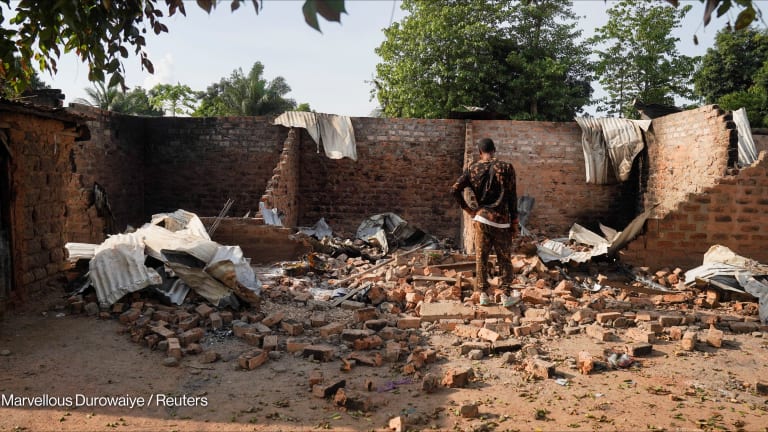
JUBA, South Sudan — In April, one of Angelina Nyajima Simon’s staff members was shot when an armed group ambushed the NGO-marked car he was traveling in back to a United Nations base in northern South Sudan. He died instantly. It was the first time the executive director lost a staffer since founding Hope Restoration South Sudan eight years ago.
After he was killed, a devastated Simon reached out to her local aid organization’s international partner, Norwegian People’s Aid, to ask if the group could provide financial support and compensation for the family. The Norwegian humanitarian organization replied that there was little they could do because it wasn’t part of their working agreement, she said.
“I felt bad [hearing this], it’s as if they didn’t care about our lives,” Simon said.
In the end, NPA helped return the victim’s body to his family, but they were unable to financially compensate his three wives and eight children. To date, Hope Restoration has paid $8,000 to the family.
Aid worker security
In this two-part series, Devex is exploring the security situation for aid workers in South Sudan, ranked most dangerous country for humanitarians.
Read part one: Staying safe in the most dangerous country for aid workers
As the security situation escalates, NGOs tell Devex how they are keeping staff safe in South Sudan.
At least 107 aid workers, almost all of them local, have been killed in South Sudan since the country erupted in fighting five years ago, making it the most dangerous place in the world for humanitarians to operate for three years in a row, according to research by Humanitarian Outcomes. Some local organizations, such as Hope Restoration, say they don’t feel they’re well-equipped with security training or adequately funded to purchase the resources that would make their operations safer — yet they commonly find themselves on the frontlines of the conflict.
A partner’s responsibility
At the start of any new project, NPA conducts a thorough contextual analysis, which includes identifying potential risks while encouraging an ongoing dialogue with its partners about how to alleviate them, said Grant Pritchard, country director for NPA in South Sudan.
The organization doesn’t provide compensation for families of deceased for its implementing partners and says it’s up to each group to establish practices to support staff and their families if something happens. The group wasn’t contractually obligated to charter a flight and return the deceased Hope Restoration staff member to his family for burial, but covered the costs as an act of compassion, Pritchard told Devex.
It’s not uncommon for the burden of security to fall to individual NGOs, but “it's a tough question because [local NGOs] and [international NGOs] have fairly different risk profiles,” said Jeremy Konyndyk, a senior policy fellow at the Center for Global Development and a former senior official at the United States Agency for International Development. While international organizations tend to be more overt targets for violence, as they’re perceived to have greater wealth, it makes sense to better train and equip local organizations’ security capacity in high-risk environments, he said.
Even though local aid groups have gained greater recognition than they had 10 years ago, Konyndyk said the power dynamics remain uneven. The imbalance is clearest during response at the field level, James Keah, founder of Universal Intervention and Development Organisation, a local NGO in South Sudan, added.
Two years ago, when fighting erupted in the opposition-held town of Nyal in Unity State for example, his staff were stranded on the ground for two days while their international partner was able to charter a flight and evacuate staff immediately.
“I don’t have anywhere to get funding to evacuate them. Yet internationals will just make a phone call and they’ll be evacuated,” Keah said. At the time of the incident, he wasn’t able to connect with the partner agency due to network issues but says they did not reach out to ask if his staff needed help to relocate to the country capital, Juba.
Incidents such as these discourage employees from working with his organization, Keah said, who regularly loses staff to international groups that can offer increased security and higher pay.
Other local aid groups point to funding as the core cause of the imbalance. The money allotted for salaries for local organizations is lower than international groups when applying for project grants, said James Labadia, program manager for AYA, a South Sudan-based aid group. While both international and national organizations struggle to secure funding to support their projects, local groups say they often have nothing left to invest in security training after paying salaries and overhead costs.
Of the several international partners working with AYA, only IsraAid, an international organization based in Israel, has provided regular security training for the NGO, Labadia said. Several times a year, IsraAid trains its local partners on best security practices, including how to handle military checkpoints and negotiate with warring factions, including the government and opposition soldiers.
“We need advice, we are learning, we need to know some of the international protocols in order to make us more credible in the eyes of other parties,” Labadia said.
IsraAid considers it part of its responsibility to ensure that its partners are thinking about and asking the right questions, according to Eliana Summer-Galai, country director for the humanitarian organization: “Whose responsibility is it? I think it’s everyone’s,” she said of safety measures.
The U.N. Department of Safety and Security does offer free three-day trainings in South Sudan, but there is a long waiting list. Hope Restoration’s Simon applied for two years in a row before gaining a spot, she said.
Policies versus practice
Donors say the primary duty of risk rests with each implementing partner. The United Kingdom’s Department for International Development reserves the right to terminate its agreements with partners if not satisfied that suppliers are able to live up to their security commitments, according to a DFID spokesperson.
DFID doesn’t directly fund any South Sudanese NGOs, but these policies extend to subcontractors, the spokesperson said. And depending on the country, context, and specifics in the agreement, USAID can provide support such as paying for costs of security measures as well as insurance and assisting with personnel recovery.
Both donors fund international initiatives focused on providing safety information and advice for those in the sector. But “training in this emergency context is not encouraged by donors,” AYA’s Labadia said.
Resources that would improve safety are often axed from proposals, according to Hope Restoration’s Simon. When she requested three motorbikes for staff working on the front lines in Unity State, the request was dropped during the proposal review, Simon said, who found it surprising since international NGOs “get a project and they get too many vehicles,” she said.
More on aid worker security in South Sudan:
► South Sudan again ranked most dangerous place for aid workers
► Attacks on aid workers, health facilities leave millions in South Sudan without care, report finds
► What South Sudan's increasingly fragmented war means for aid delivery
In one instance, one of her staffers walked for eight hours to reach a community in an insecure area. She has since put in a new proposal for a car, which is being granted, she said.
UNIDO’s director Keah has been asking donors to equip his team with radios so that they can connect with their base in the field, especially in areas with no phone network. But when he has included radios in grant proposals, he said he has been instructed to remove it.
As a veteran in the industry and as someone who employs international regional staff, Keah understands that donors must make careful decisions about what to fund, and that internationals working in harsh contexts such as South Sudan require increased safety measures: “When there’s a security problem, I pay more attention to the internationals because I have to know their safety,” Keah said. “For the nationals, I know they can survive.”
It would cause the community to lose confidence in the aid group if its local staff felt the need to evacuate every time there was a shooting, he said. But he maintains that local staffers could benefit from more attention. Earlier this year, three of UNIDO’s employees were killed when fighting erupted in Leer, in Unity State. Two of them were shot while working at a medical clinic helping wounded civilians.
“They heard the shooting, but they thought that since they weren’t military and not near the confusion of the fighting, that they’d survive,” Keah said. His staff continued treating patients until they were gunned down by armed men who entered the clinic.
Neither of them had received any security training, which Keah says might have helped save their lives: “One thing the training teaches is that you have to be alert,” he said. “They could have run and hid themselves, but they didn’t do that.”
Update Oct. 11, 2018: This article has been updated to clarify that almost all aid workers killed in South Sudan have been local aid workers.








